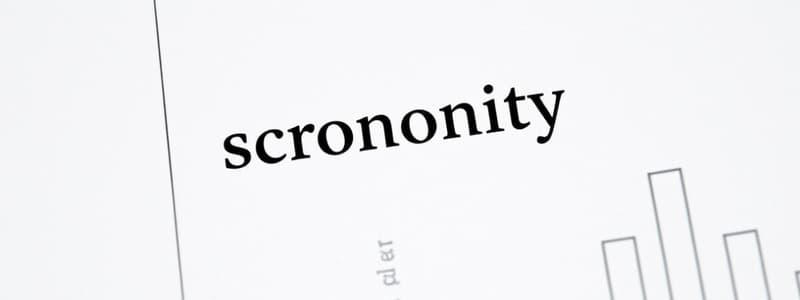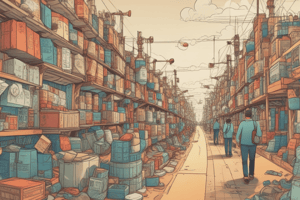Podcast
Questions and Answers
What is scarcity?
What is scarcity?
- The unlimited nature of society's resources
- The distribution of economic prosperity
- The study of how society manages its resources
- The limited nature of society's resources (correct)
What is economics?
What is economics?
The study of how society manages its scarce resources.
What is efficiency?
What is efficiency?
The property of society getting the most from its scarce resources.
What is equality?
What is equality?
What does it mean to be rational?
What does it mean to be rational?
What is opportunity cost?
What is opportunity cost?
What are marginal changes?
What are marginal changes?
A rational decision-maker takes an action only if...?
A rational decision-maker takes an action only if...?
What is an incentive?
What is an incentive?
What is a market economy?
What is a market economy?
What are property rights?
What are property rights?
What is the 'invisible hand' principle?
What is the 'invisible hand' principle?
What is market failure?
What is market failure?
What is an externality?
What is an externality?
What is market power?
What is market power?
What is a monopoly?
What is a monopoly?
What is productivity?
What is productivity?
What is inflation?
What is inflation?
What is a business cycle?
What is a business cycle?
People face...?
People face...?
What is the guns vs. butter debate?
What is the guns vs. butter debate?
The cost of something is...?
The cost of something is...?
What is the opportunity cost of going to college?
What is the opportunity cost of going to college?
Rational people...?
Rational people...?
People respond to...?
People respond to...?
Who does trade make better off?
Who does trade make better off?
What is usually a good way to organize economic activity?
What is usually a good way to organize economic activity?
How can the government sometimes improve market outcomes?
How can the government sometimes improve market outcomes?
What does a country's standard of living depend on?
What does a country's standard of living depend on?
What happens when the government prints too much money?
What happens when the government prints too much money?
What causes the business cycle?
What causes the business cycle?
Which is more efficient: market economies or centrally planned economies?
Which is more efficient: market economies or centrally planned economies?
In the U.S., if income has grown about 2% per year, how many years does it take to double?
In the U.S., if income has grown about 2% per year, how many years does it take to double?
In the short run, falling inflation is associated with?
In the short run, falling inflation is associated with?
Flashcards
Scarcity
Scarcity
The fundamental problem in economics, where unlimited wants clash with limited resources.
Economics
Economics
The study of how societies manage scarce resources, making choices to allocate them effectively.
Efficiency
Efficiency
The key to maximizing output from limited resources, making the most of what we have.
Equality
Equality
Signup and view all the flashcards
Rational Behavior
Rational Behavior
Signup and view all the flashcards
Opportunity Cost
Opportunity Cost
Signup and view all the flashcards
Marginal Changes
Marginal Changes
Signup and view all the flashcards
Rational Decision-Making
Rational Decision-Making
Signup and view all the flashcards
Incentives
Incentives
Signup and view all the flashcards
Market Economy
Market Economy
Signup and view all the flashcards
Property Rights
Property Rights
Signup and view all the flashcards
Invisible Hand
Invisible Hand
Signup and view all the flashcards
Market Failure
Market Failure
Signup and view all the flashcards
Externality
Externality
Signup and view all the flashcards
Market Power
Market Power
Signup and view all the flashcards
Monopoly
Monopoly
Signup and view all the flashcards
Productivity
Productivity
Signup and view all the flashcards
Inflation
Inflation
Signup and view all the flashcards
Business Cycle
Business Cycle
Signup and view all the flashcards
Trade-offs
Trade-offs
Signup and view all the flashcards
Guns vs. Butter Debate
Guns vs. Butter Debate
Signup and view all the flashcards
Opportunity Cost of Education
Opportunity Cost of Education
Signup and view all the flashcards
Rational Thinking
Rational Thinking
Signup and view all the flashcards
Response to Incentives
Response to Incentives
Signup and view all the flashcards
Benefits of Trade
Benefits of Trade
Signup and view all the flashcards
Organizing Economic Activity
Organizing Economic Activity
Signup and view all the flashcards
Government Intervention
Government Intervention
Signup and view all the flashcards
Income Growth
Income Growth
Signup and view all the flashcards
Oversupply of Money
Oversupply of Money
Signup and view all the flashcards
Business Cycle Causes
Business Cycle Causes
Signup and view all the flashcards
Efficiency of Market vs. Centrally Planned Economies
Efficiency of Market vs. Centrally Planned Economies
Signup and view all the flashcards
Consequences of Falling Inflation
Consequences of Falling Inflation
Signup and view all the flashcards
Study Notes
Key Concepts in Microeconomics
- Scarcity: Limited resources versus unlimited wants; fundamental problem in economics.
- Economics: Study of resource management in societies with scarce resources.
- Efficiency: Maximizing output from limited resources.
- Equality: Even distribution of economic prosperity among society members.
- Rational Behavior: Systematic decision-making in pursuit of objectives.
Core Economic Principles
- Opportunity Cost: Value of the next best alternative that is forgone when making a decision.
- Marginal Changes: Small adjustments to existing plans, vital for decision-making.
- Rational Decision-Making: Actions are taken if marginal benefit exceeds marginal cost.
- Incentives: Factors that motivate individuals to act.
Market Dynamics
- Market Economy: Systems driven by household and firm interactions determining resource allocation.
- Property Rights: Individuals’ control over scarce resources, crucial for economic efficiency.
- Invisible Hand: Self-interest in the marketplace can lead to societal welfare maximization.
- Market Failure: Occurs when resources are not allocated efficiently, leading to inefficiencies.
External Factors
- Externality: Effects of one individual's actions on bystanders, influencing market efficiency.
- Market Power: Capacity of individuals or groups to affect market prices significantly.
- Monopoly: Market structure with a single seller dominating supply.
Economic Indicators
- Productivity: Measure of output per labor unit; key to economic growth.
- Inflation: Rise in overall price levels in an economy.
- Business Cycle: Regular fluctuations in economic performance, involving growth and recession.
Trade-offs and Choices
- Trade-offs: All decisions involve giving up alternatives to pursue a preferred outcome.
- Guns vs. Butter Debate: Economic allocation dilemma between defense spending and social programs.
- Opportunity Cost of Education: Balance between tuition costs and forgone earnings from potential employment.
Behavioral Economics
- Rational Thinking: Decision-makers consider incremental benefits and costs.
- Response to Incentives: Individuals adapt behavior based on perceived incentives.
Trade and Economic Organization
- Benefits of Trade: Positive impact on all parties involved, enhancing overall welfare.
- Organizing Economic Activity: Markets generally promote efficient economic organization.
Government's Role
- Government Intervention: Can protect property rights, improve efficiency and equality, and regulate monopolies.
- Income Growth: In the U.S., income grows approximately 2% annually, requiring around 35 years for doubling.
Economic Relationships
- Oversupply of Money: Leads to rising prices, highlighting the inflation impact.
- Business Cycle Causes: Influenced by a trade-off between inflation and unemployment.
Comparative Economic Systems
- Efficiency of Market vs. Centrally Planned Economies: Market economies tend to be more efficient than centrally planned counterparts.
- Consequences of Falling Inflation: Associated with rising unemployment, indicating potential economic distress.
Studying That Suits You
Use AI to generate personalized quizzes and flashcards to suit your learning preferences.




